Editors note: It was pointed out to me by a reader (see comment at bottom of article) that “music therapy” and “art therapy” refer to specific health care modalities with rigorous training, certification and licensing requirements for practitioners. This article is not intended to replace the value and impact a certified therapist offers.
Contributing Writer: Heather O’Neil, caregiver and founder of Creative Carer
My mum was diagnosed with Mixed Dementia in 2012 and since then I have been on a mission to find ways that I can help her maintain a good quality of life. I am constantly researching, desperately looking for ideas to stimulate her mind and keep her happy.
I have come across 3 Therapies that have helped us considerably – Art Therapy, Music Therapy and Pet Therapy – we now use all three in our daily routine.
Not only are these therapies good for the person with memory problems, but also for their carer.
Scheduling quality time together every day is so important; time to sit together and relax with crafts or music, or going out in nature to an animal park – these times are so special.
My mum soon forgets where we have been so I create photo boards for her wall. It’s lovely to see her looking at the pictures smiling… just like she smiles when we are on our trips out 🙂
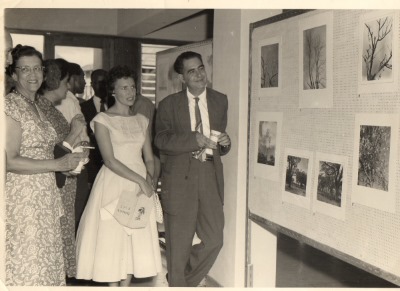
Mum’s art on display
My mum was an accomplished artist who had exhibited her paintings when she was in her 20’s. She passed on her love of the creative arts to me & I graduated in 1984 with a degree in Art & Textile design.
Over the years art took a back-seat in my life and only resurfaced when I discovered how invaluable it is for those with memory problems.
Art Therapy is now well recognized for enhancing the quality of life for Dementia patients and I have embraced it wholeheartedly over the last 2 years.
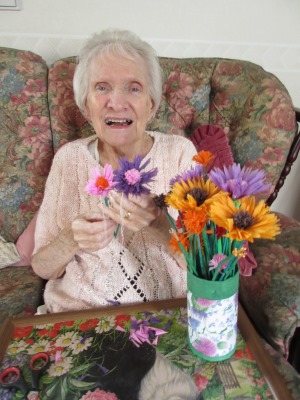
Mum making flowers
Every day we schedule time for a creative project; making paper flowers, hand-made cards, or sewing lavender sachets. My mum is never happier than when she is being creative, and I have found that she is now more relaxed and less agitated.
Crafts have given her back a way of expressing herself, and provide her with a real sense of accomplishment. When my mum is immersed in her crafts her artistic flair re-emerges and she has noticeable moments of clarity.
Making crepe-paper flowers is one of her favourite hobbies. She is very proud of her flowers & loves having something to give to people who admire them. The doctor’s office, memory clinic, friend’s houses are all brightened up with her pretty flowers.
Unlike jigsaw puzzles or colouring books that are tidied up or put away, the flowers are all over the house! Beautiful ever-lasting reminders of time spent being creative together that I will always cherish!
My mum has always loved singing and was in the church choir as a child. In her early twenties she was in a music group that put on wonderful performances which she can remember very clearly.
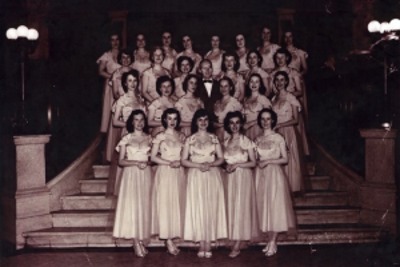
Mum in her singing group
I have discovered that Music Therapy is increasingly a key feature in dementia care.
A recent study has proved that music boosts brain activity and evokes emotion. It can alter moods, manage stress and reach parts of the damaged brain in ways that other forms of communication cannot.
My mum and I regularly attend ‘Singing for the Brain’ sessions (run by the Alzheimer’s Society across the UK). I also make sure that we have her favourite old era music on in the background at home, or in the car.
She absolutely loves a good sing song and although her short term memory has completely gone, she can remember all the words of her favourite songs!
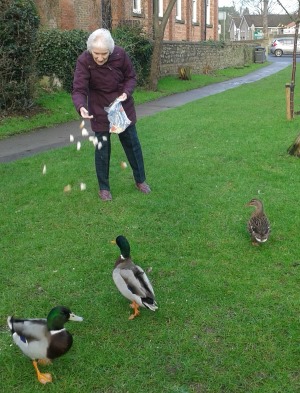
Mum feeding the ducks
There have been many studies recently on the benefits of contact with animals for people with dementia. Research suggests that Pet Therapy reduces agitation, lowers blood pressure and heart rate and boost levels of the feel-good hormone, serotonin.
For my mum, I believe the main benefit to be improved mood and decreased anxiety.
Getting out in nature is a therapy in itself and so at least once a week I take her out to visit an arboretum, animal park, or simply to feed the ducks at the local river.
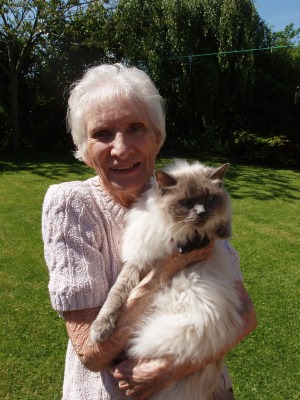
Mum with Gabby
My mum has always been an animal lover – over the years she has had a variety of pets from cats and dogs to turtles and donkeys! Her only pet now is a Ragdoll Siamese cat, ‘Gabby’, who is the love of her life. He follows her wherever she goes and sits with her while she is working on her crafts.
I hope and pray that my mum will continue to be able to engage and enjoy all her hobbies. I will do all I can to keep these Therapies going and make the very most of my time with her.
To care for those who once cared for us is one of the highest honours.
 About the author: Heather O’Neil is the primary caregiver for her Mum who was diagnosed with mixed dementia in 2012. Heather is very passionate about discovering ways to maintain her mum’s quality of life, and sharing her discoveries with others. She blogs and shares many of these great ideas on her site Creative Carer and her Facebook page – be sure to stop by and like her page.
About the author: Heather O’Neil is the primary caregiver for her Mum who was diagnosed with mixed dementia in 2012. Heather is very passionate about discovering ways to maintain her mum’s quality of life, and sharing her discoveries with others. She blogs and shares many of these great ideas on her site Creative Carer and her Facebook page – be sure to stop by and like her page.
If you like what you’ve read, why not receive periodic updates when you:
Subscribe to the TinT Newsletter
What activities have you discovered that help you and your loved one? I love to here from you, so please comment below:





Heather,
Thank you so much for sharing. Engagement is so important for those with dementia. Thinking outside the box like you have done here is so useful and helpful for those caregivers as well as those they care for! Your mom is beautiful and is a perfect example of how this really works!
Thank you so much!
Aileen Ruess
CaregiversAssist.com
Thank you for your comment Aileen 🙂
Thank you for your lovely comment Aileen.
It means a lot <3
My mom had episodes of dementia. She loved to sit in her porch and watch the birds. My mom past away last year and since then I’ve been making bird feeders. Just one of the wonderful loves she has past on to me. There’s a link to my feeders on my blog posted below.
I’m sorry for your loss, and thank you for commenting. Backyard birding is fun. I like seeing the different birds come through depending on the season. The morning doves just had babies, and now we have what I think is an oriole visiting.
Great article however I noticed that a very important therapy that is also key in Dementia care is missing . Recreational Therapy or TR is often overlooked or labeled “The Bingo Department” in facilities but Recreational or TR is so much more than Bingo. For some who are not artistic or do not like pets, TR uses a persons leisure preferences to enhance quality of life. So for instance if someone with Alzheimer’s or Dementia was an avid card player and can not play anymore due to cognitive decline, a Rec Therapist can come in and modify the game so that they can still enjoy something that was lost or taken away due to this disease. For more info on TR and how it helps people suffering from Alzheimer’s and Dementia check out my blogs at
www. RecBox.org.
That’s awesome, and I love what you are doing. I had simply been calling it “stimulation” but therapeutic recreation makes so much sense.
I love the idea of modifying an interest a person once had but cannot really do now because of dementia related problems. My husband is highly creative as an artist. He taught graphic design at the college level for many years and holds the highest post graduate degree available in his field. However, he never liked crafts (“artsy fartsy” he used to say with disdain) and looked his nose down at people who did like them. His fine motor skills are just not what they once were — his hands often shake so badly it’s hard for him to even hold a fork. He was prolific on the computer but he has only 25% vision, so that is out. I’m wondering what I can actually do to help him express himself artistically without offending him. Any ideas?
Thank you for sharing Bonnie. Although he didn’t like crafts in the past, you shouldn’t assume that he won’t like them now. Many of today’s dementia artists never like painting before their dementia.
I realize vision is problem; you want to also stimulate his other senses such as smell (oranges, herbs), hearing (music, instruments), touch, etc.
At the bottom of this article (in pink) there is a link to a list of 100 ideas. http://togetherinthis.com/loved-one-enriched-just-pacified/
I know this isn’t graphic design, but maybe take him to an art store; maybe it will feel like he’s in a familiar element. Contact a local memory care community and see if they have any art shows; my local one has an annual event.
Most of all stay creative and persistent. Adapt, Modify, and Try new things. What didn’t work yesterday, may work tomorrow. I hope the best for you and your husband.
Edit: The next email I opened (Karma at work?) had information directly related to your question, and gives may good suggestions that I did not: Link to the 3 minute video: https://alzheimerscareresourcecenter.com/wednesday-workshop-new-activities-for-people-living-with-alzheimers-disease/
This was lovely to read, how you have used all your ability and love to give the very best to your mum wonderful. My husband the most loving caring man I have ever known has just been diagnosed with vascular dementia. This is a lot to take in, what will happen to him, I can never imagine him being agressive if this happens I know it is such a horrible disease that would do this to him. It is frightening to read up about what may happen. I don’t have any family, my 50yr only son took his wifes side when she told so many lies but that is all in the past. Their 2 sons live with us and have been great but don’t know how they are going to cope seeing their so much loved grand father (Da as they call him)he has been their father figure. It is scary not knowing what might happen. Unfortunately, I am not able to take him out due to his very swollen ankles and poor mobility. Thank you for letting me pour it all out. Love Karla xxx
Hi Karla,
Thank you for your kind words and for sharing. It is definitely a scary situation, so the more you can learn, the more strength you will have. I recommend that you use my person centered profile to note what his likes and dislikes are. I realize you already know these things but putting them on paper will help you think of more things, plus you can share it with others. http://togetherinthis.com/wp-content/uploads/2016/03/Person-Centered-Profile.pdf
Super article from Heather – her love, care and creativity shine through. A wonderful example of superb care.
Creative thinking is so important in caring for someone with dementia and everyone is different so it’s great to see all these ideas being shared. My sister and I were always looking for new ways to engage mum, make her feel valued and loved, and to try to understand her needs. In the later stages we watched for any clue as to what she might like to do and what she was still capable of doing. I remember seeing her counting the buttons on her cardigan one day – this lead to me bringing out the dominoes. This turned out to be a great success and mum continued to play with us into the very late stages of her dementia. Even when she could talk very little, she was still able to play with a little help and patience.
I am now trying to pass on my experience through my blog too ( https://www.limonattire.com/blogs/news) One never knows what might help someone.
I have so much more to write yet though – I just need to find the time!!
Barbara
Thank you for the very positive comment. I appreciate you also sharing how you were able to be a dementia detective to help your mum. I’ll be sure to check out your site which after a quick glance looks like a wonderful resource. I see what I can do to help share and bring awareness to it. 🙂
Lovely article!
I would like to point out that “music therapy” and “art therapy” refer to specific health care modalities with rigorous training, certification and licensing requirements for practitioners. In the US, for example, a Music Therapist must be board-certified, hold at least a Bachelor of Music Therapy (Master’s preferred), complete 1200 hours of clinical training and sit for the board certification exam. Providing music in the environment such as singing or listening to favorite CDs, is not Music Therapy, because Music Therapy requires a therapist to deliver the interventions. So, your article would be more accurate if it referred to “Music Activities”, and “Art Activities” instead of Therapies. This is a common misunderstanding in the media and I just wanted to shed some light on the issue. Thank you!
Thank you Anne for providing this information – I had no idea. I definitely don’t want to mislead anyone, so I’ve added a note at the top of the article 🙂